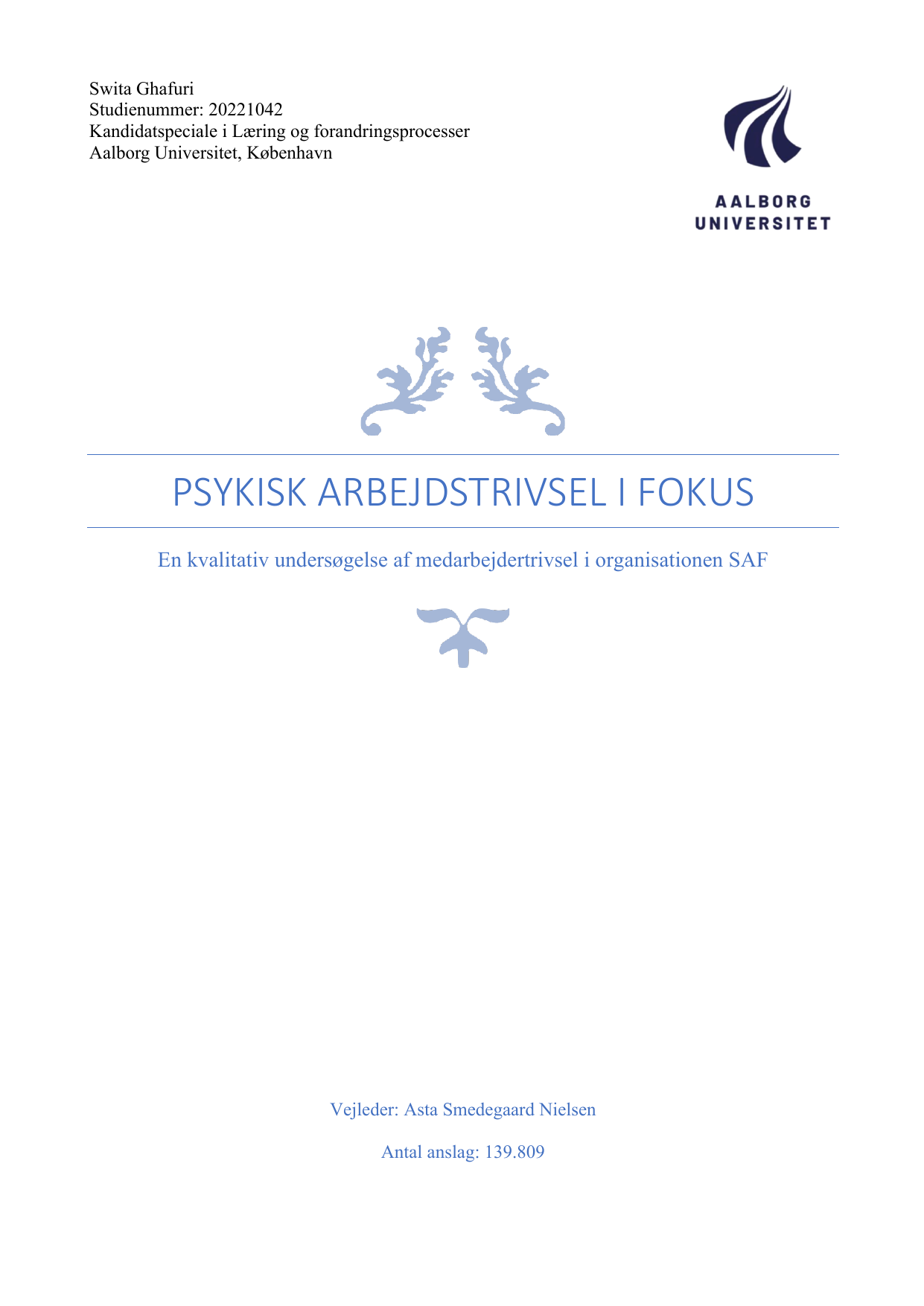
Psykisk arbejdstrivsel i fokus: En kvalitativ undersøgelse af medarbejdertrivsel i organisationen SAF
Oversat titel
Psychological work well-being in focus: A qulitative study of employee well-being in the organization SAF
Forfatter
Semester
4. semester
Uddannelse
Udgivelsesår
2024
Afleveret
2024-05-31
Antal sider
50
Abstract
This thesis examines the understandings of the psychological work environment from the organization SAF. The purpose of this thesis is to identify significant areas in relation to how the psychological work environment in SAF can be improved based on the national guidelines for a healthy and safe psychological work environment (Arbejdstilsynet, u.d.). Significant issues are therefore been discussed with the intention of opening up to new knowledges and understandings in relation to what you as an organization and manager should be aware of in order to protect the psychological well-being of employees. The empirical work of this thesis is based on a qualitative study that includes interviews with five former and current employees and their understandings of the psychological work environment from SAF as their work place. These understandings have been themed as; Employees expectations in relation to employee well-being, manager´s lack of responsibility for employee well-being and support and recognition among the coworkers. These themes have been analyzed with the inclusion of two theoretical definitions which have included the Psychological Contract (Rousseau, 1990) and the Effort-Reward Imbalance Model (Siegrist, 2017). With the inclusion of the scientific theory hermeneutics (Højberg, 2009) as strategy for the analysis these themes have been interpreted in interaction with significant points from work environment research, where especially Psychological Security (Edmondson, 2018) is argued to have an important influence for employees' understandings of the psychological work environment. Furthermore important results from the analyzed themes are discussed with the focus of upbringing new knowledge to the examination of the topic psychological work environment and the thrive of employees. It has been clarified that it is important that the vision of the organization and the psychological thrive of the employees are in accordance with each other. It has also been discussed whether the prominent generational gap in the organization and generational management can be a decisive factor in the experiences of the employees understandings of the psychological work environment. Furthermore a discussion of the chosen methods identifies the issues of examining a field study which you as a researcher have been a part of. The issues are based on the matter of closeness and closure due to lived experiences and first hand observations, knowledge of the organization and experienced relations with the manager and the coworkers (Alvesson, 2009). The analyzes of the report and the understandings of the employees psychological work environment have shown that there have been several different imbalances in the work environment that can be advantageously developed in order to become closer in achieving the goals from the national guidelines for a healthy and safe psychological work environment. It has been concluded that the expectations of the employees matter of well-being versus the manager's handling and priority of the area have been shown to be out of balance. Furthermore, there has been an imbalance in the relationship between the employees and the manager versus the relationship among the employee team. This imbalance has been shown to have affected the trust between the employees and the manager due to their strong collegial relationship. In addition, it is concluded that it is essential for small organizations that there is a continuous focus on developing a high degree of psychological security, as this will create a safe space to talk openly about challenges, doubts and work concerns. My analytical results have highlighted that other psychosocial conditions, such as the employee's expectations of work effort and their corresponding reward, the psychological contract between the employees and the manager as well as the manager's relationship with his employees have shown to have a significant influence on the psychological work environment. It is therefore also a significant conclusion that the manager's behavior, including his understandings and expectations, have helped to shape the work culture in the organization in a negatively way. Therefore, the organization's manager should look inward and recognize that his expectations and behavior characterize the psychological working environment, which is a reason why the manager should develop and adapt his skills to ensure the psychological thrive of his employees. Furthermore, it has been concluded that a high level of thrive among an organization's employees will affect the organization's results in a positive way. In addition, it has also been concluded that SAF can consider an organizational structure where responsibility for the psychological work environment is assigned to a specific manager. This can help to ensure the thrive of the employee to become a central and ongoing priority, while the strategic and financial goals remain in focus. Another area of effort that the organization can advantageously develop is the onboarding of new employees. As my analytical results have highlighted it is essential for workplaces to complete an adequate onboarding of new employees, as this will have a significant impact on, whether employees stays in an organization or tend to leave.
